Top 10 HR Management System
Managing a human resources (HR) department often means balancing many tasks at once. However, top-rated HR information systems (HRIS) and HR management systems (HRMS) can streamline your work and make your job significantly easier. To assist you in finding the ideal solution, we researched and tested the leading HR software, selecting these options based on their features, pricing, support, integrations, and user feedback.
Why to use an HR Management System?
Using an HR management system is essential for streamlining and automating various human resource tasks, making the management of employee data, payroll, performance tracking, and compliance much more efficient. By centralizing all HR functions into one platform, businesses can reduce manual errors, improve communication, and ensure that critical processes like recruitment, onboarding, and employee development are handled smoothly. These HRMS and HRIS also provide valuable insights through reporting and analytics, helping HR teams make informed decisions that support company growth and employee satisfaction. Ultimately, an HR management system saves time, increases productivity, and enhances the overall employee experience.
Here 10 of the Top HR Management System Softwares to Consider
Here are 10 of the top HR management system software solutions to consider for streamlining your HR processes.
Gusto
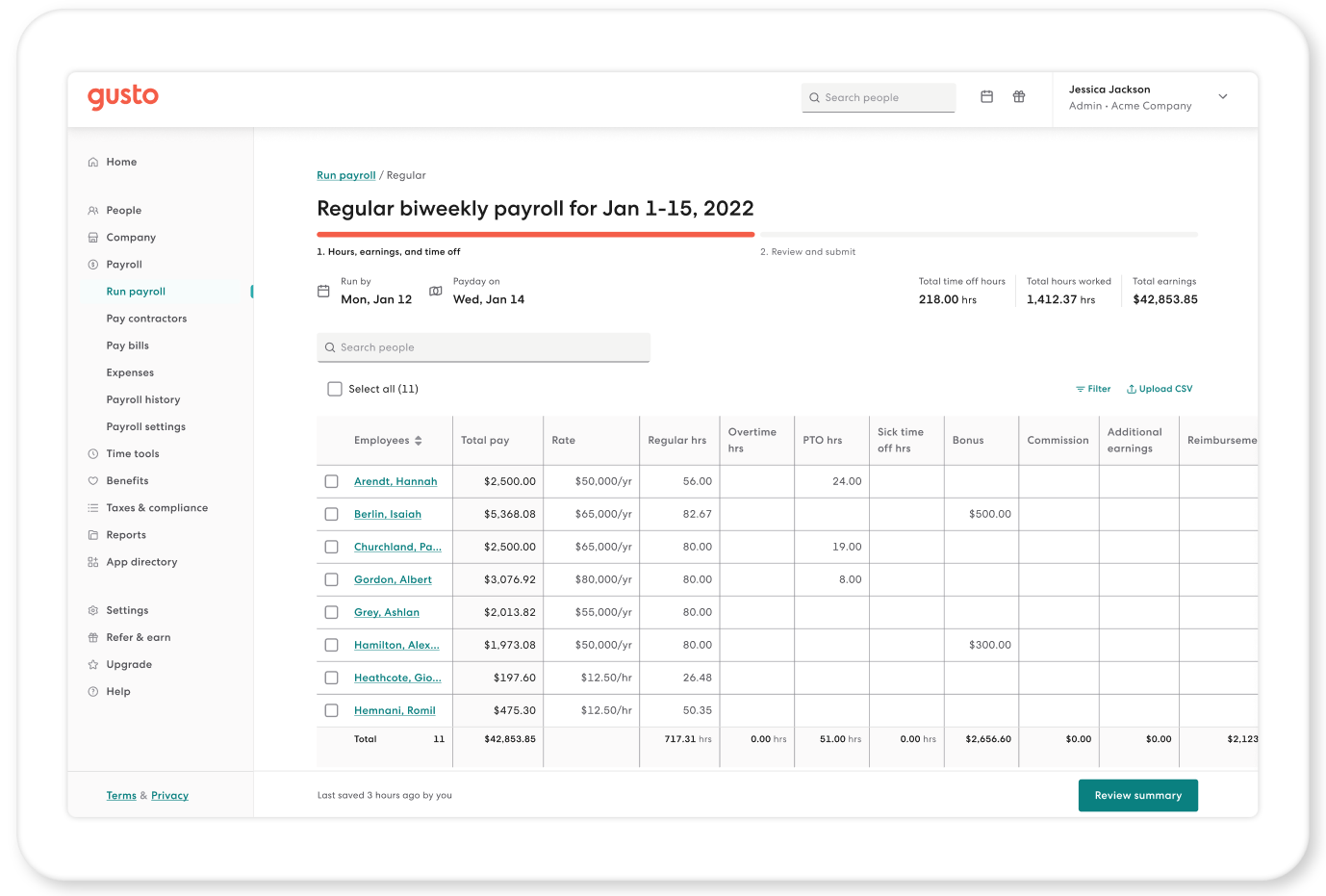
Gusto’s cloud-based platform addresses several crucial aspects of human capital management, including onboarding, employee engagement, payroll, and insurance. Its user-friendly interface helps organizations enhance performance while managing key areas like compliance and the bottom line.
Starting price: $40/month + $6/employee/month
Pros
Clear pricing structure, Three flexible plans to meet evolving needs.
Unlimited payroll runs
Payroll support for domestic and international contractors
Automated tax filing and compliance assistance
Cons
No free trial and the cost per person becomes expensive at scale.
Requires significant upfront manual data entry.
Benefits and time-off data aren’t fully integrated across the platform.
Does not support international employee payroll.
Limited functionality in the mobile app.
BambooHR
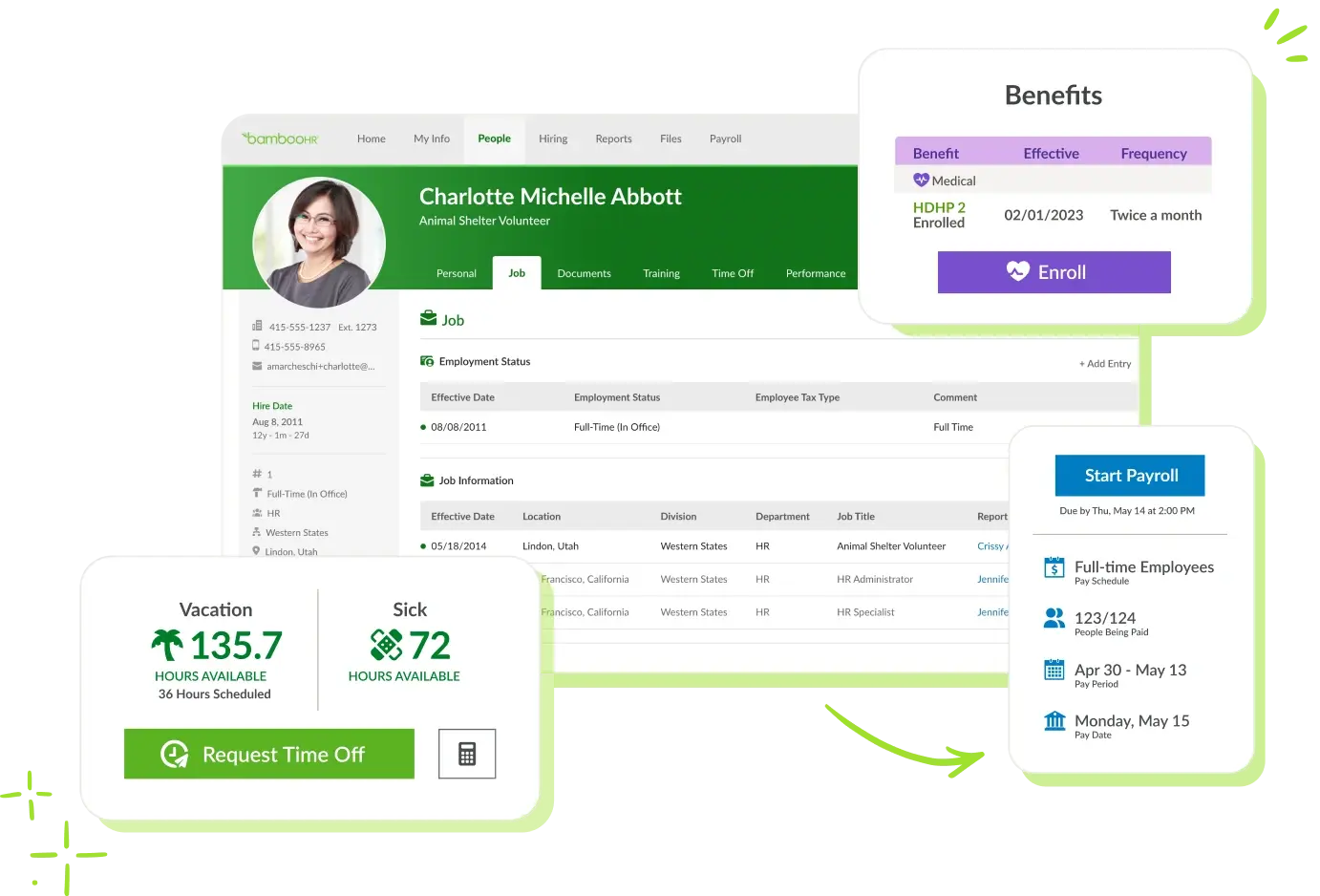
BambooHR is a comprehensive HRMS platform used in over 120 countries, making it ideal for global teams. It features a powerful data management dashboard with 45+ built-in reports for easy record-keeping and employee data visualization. The flexible performance assessment tool allows HR and employees to track goals and evaluations transparently. Additionally, BambooHR’s offboarding feature helps create a smooth exit process, enhancing the chances of a positive departure.
Starting price: contact sales to get pricing
Pros
Intuitive, user-friendly interface.
Full range of essential HR features.
Strong employee self-service options.
Customizable reports and analytics tools.
Cons
Upfront pricing is not disclosed
Can be expensive for smaller businesses.
Payroll functionality is limited without additional add-ons.
Certain advanced features may require upgrades.
Paycor
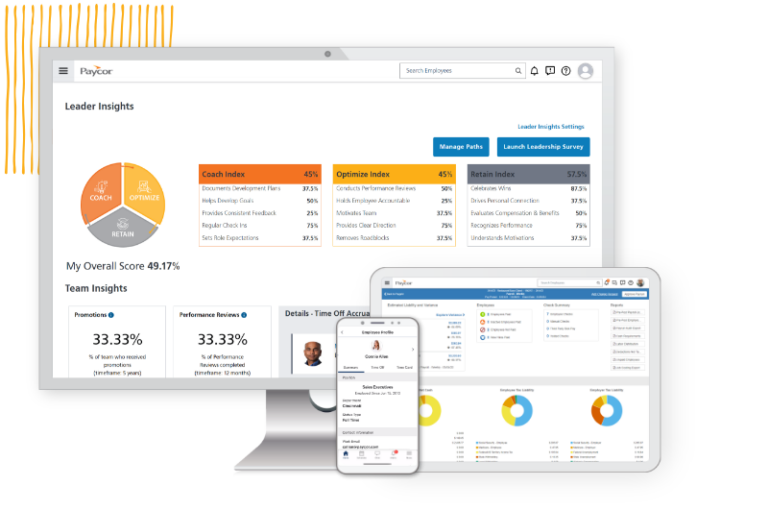
Paycor is a comprehensive HR and payroll solution designed to streamline and automate essential workforce management tasks. It offers a wide range of features, including payroll processing, talent management, time tracking, and employee benefits administration, all in one integrated platform. Paycor is known for its user-friendly interface and scalable options, making it suitable for businesses of all sizes. With robust reporting tools and compliance management, Paycor helps organizations stay efficient and compliant while providing an enhanced employee experience.
Starting price: contact sales to get pricing
Pros
Comprehensive HR and payroll features
Scalable plans for businesses of all sizes.
Strong employee self-service portal.
Integrated time tracking and benefits administration.
Effective compliance management.
Cons
Can be expensive for smaller businesses
Limited customization in certain areas.
Advanced features may require higher-tier plans.
Occasional system updates can cause disruptions.
Zoho People
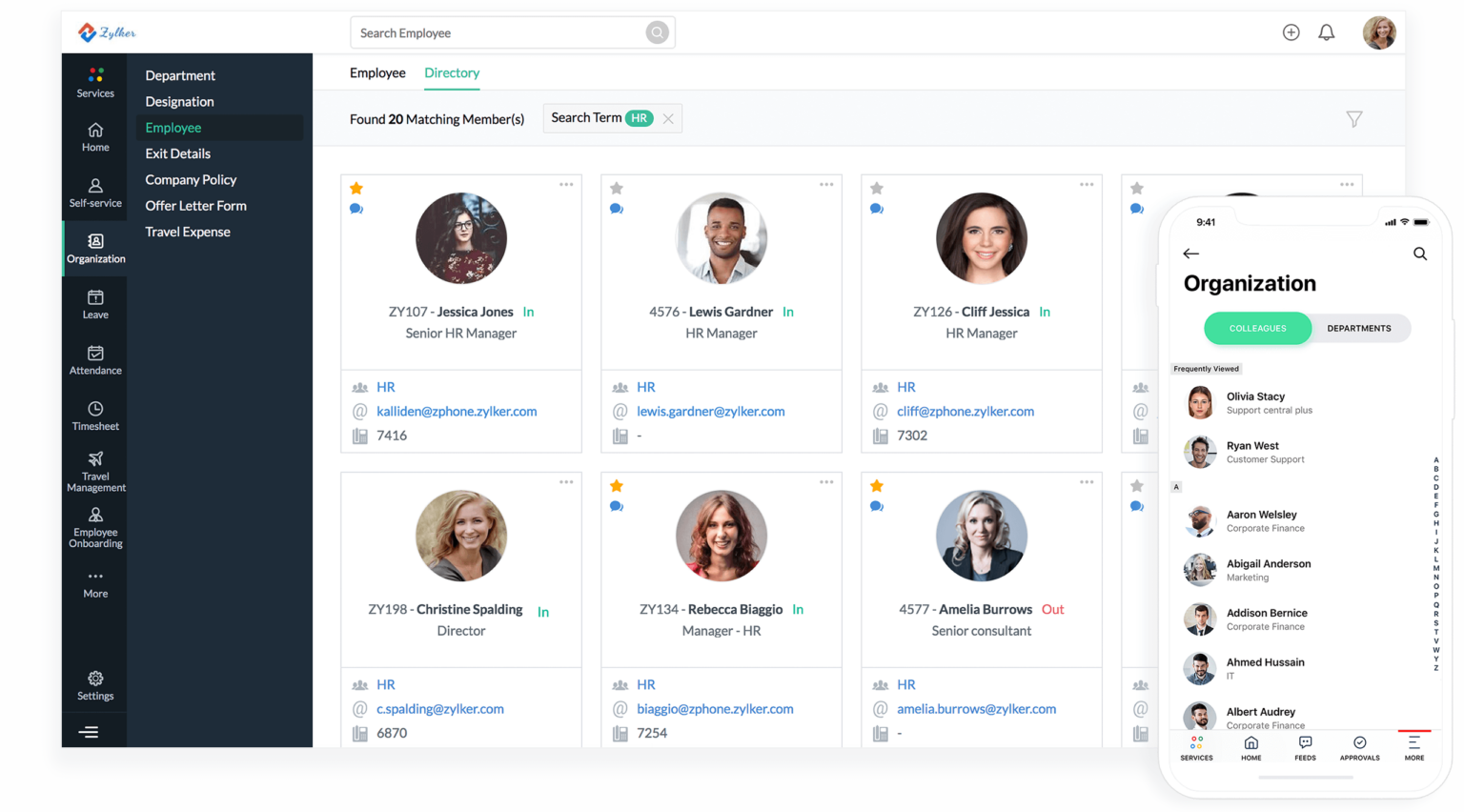
Zoho People is a cloud-based HR management system designed to simplify and automate core HR processes. It offers a wide range of features, including employee management, time and attendance tracking, performance evaluations, and leave management. Zoho People is known for its flexibility, customizable workflows, and seamless integration with other Zoho apps, making it ideal for businesses of all sizes. With an intuitive interface and a mobile app for on-the-go access, Zoho People helps HR teams enhance productivity while providing employees with a self-service portal for managing their own information.
Starting price: $1.50 per user per month
Pros
Highly customizable workflows and features.
Seamless integration with other Zoho apps.
Comprehensive HR management tools.
Mobile app for remote access
Affordable pricing for small businesses.
Employee self-service portal
Scalable for businesses of different sizes.
Cons
Limited advanced features compared to larger HR platforms.
Reporting capabilities could be more robust.
Some integrations with third-party apps may require additional setup.
The learning curve for customizing workflows
GoCo
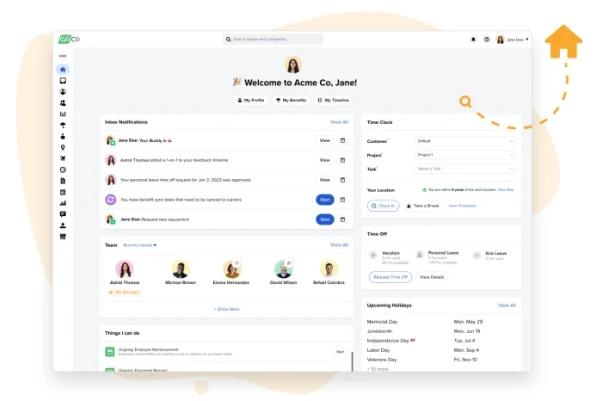
GoCo is a modern, cloud-based HR platform designed to streamline essential HR tasks such as payroll, benefits administration, onboarding, and employee management. Known for its flexibility and ease of use, GoCo offers a highly customizable experience that integrates with popular third-party tools, making it ideal for small to medium-sized businesses. With a focus on automation and compliance, GoCo simplifies complex HR processes while enhancing employee engagement through self-service features. It’s an all-in-one solution that helps HR teams save time and focus on strategic initiatives.
Starting price: contact sales to get pricing
Pros
Flexible and highly customizable workflows.
Seamless integration with third-party tools.
Automation of complex HR processes.
Compliance management tools.
Ideal for small to medium-sized businesses.
Employee self-service portal
Scalable for businesses of different sizes.
Cons
Limited advanced features for larger organizations.
Pricing can be high as more features are added.
Limited customization options in certain areas.
Payroll functionality may require third-party integration.
Rippling
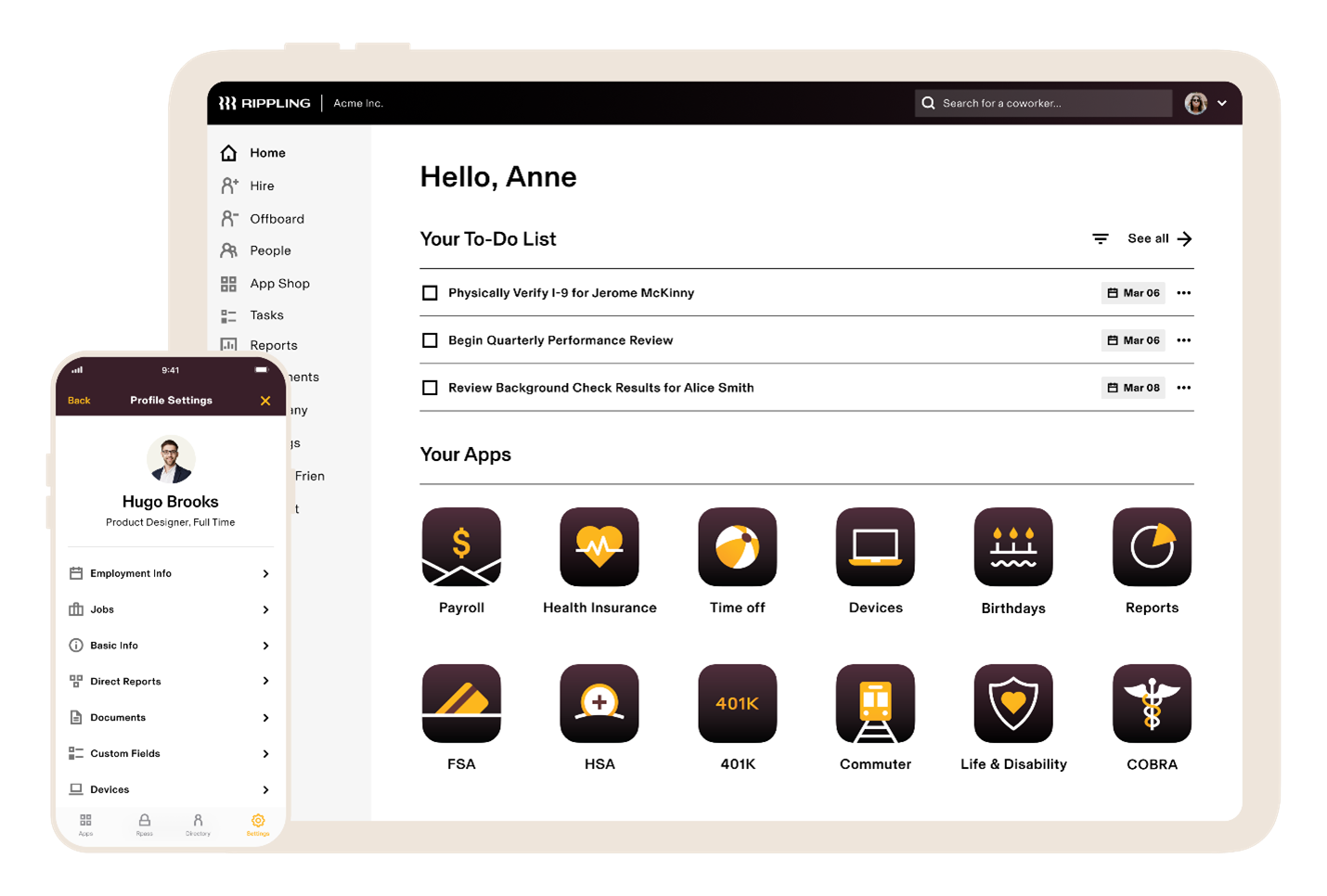
Rippling is an all-in-one HR platform that combines payroll, benefits, time tracking, and employee management into a single, integrated system. Known for its automation capabilities, Rippling streamlines HR workflows and helps businesses manage their workforce with ease. One of its standout features is the ability to manage not only HR tasks but also IT-related processes like device and app management, making it ideal for companies looking to consolidate operations. With its user-friendly interface, seamless integrations, and scalability, Rippling is a powerful solution for businesses of all sizes looking to simplify HR and IT management.
Starting price: contact sales to get pricing
Pros
Highly customizable and modular pricing structure.
Streamlines payroll, benefits, and time tracking.
Excellent automation features for reducing manual tasks.
User-friendly interface with a modern design.
IT device and app management capabilities for onboarding and offboarding.
Scalable for businesses of different sizes.
Cons
Pricing can increase quickly with added modules.
Payroll and benefits features are not included in the base plan.
Some users report a learning curve due to the platform’s extensive features.
Limited advanced HR reporting features compared to dedicated platforms.
Workday
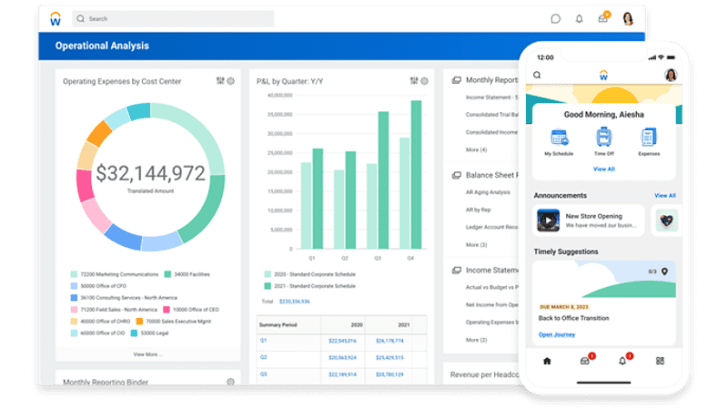
Workday is a comprehensive cloud-based HR system designed to streamline and manage various aspects of human capital management (HCM). From recruitment and onboarding to performance management, payroll, and compensation, Workday provides a unified platform that supports organizations in effectively managing their workforce. Known for its scalability and powerful analytics, Workday is ideal for medium to large-sized companies looking to optimize their HR processes and improve decision-making through real-time data insights. Its user-friendly interface and seamless integration with other business applications make it a robust solution for modern HR needs.
Starting price: contact sales to get pricing
Pros
Recognized for its user-friendly and intuitive interface.
Provides customizable features.
Offers strong integration with third-party applications.
Supports customers through phone and online assistance.
Cons
Pricing is not available on the website
No free version
Users must request free trials (specifically for the Workday Adaptive Planning platform)
Some users report a steep learning curve for advanced features.
ADP
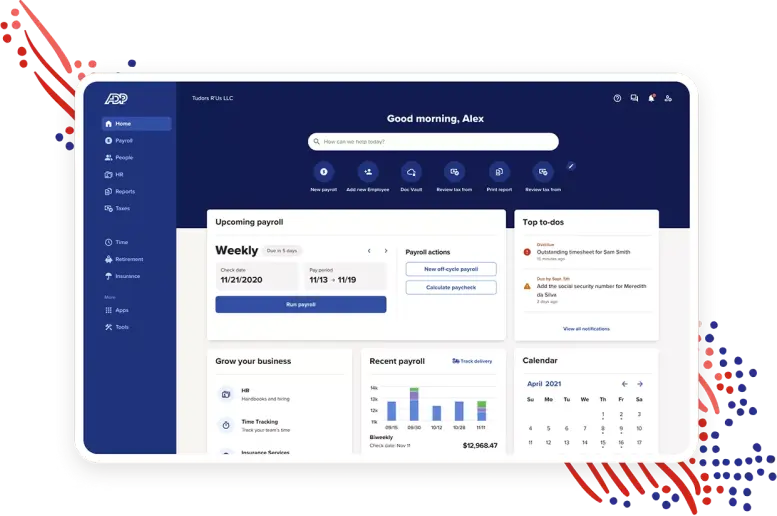
ADP is a powerful and versatile HR system designed to manage various workforce management tasks, including payroll, benefits administration, time tracking, and talent management. Known for its reliability and scalability, ADP serves businesses of all sizes, from small companies to large enterprises. It offers a cloud-based platform that integrates seamlessly with other business tools and provides robust automation to simplify HR processes. With features like automatic tax filing, compliance management, and employee self-service portals, ADP helps organizations streamline their HR operations while ensuring accuracy and efficiency.
Starting price: contact sales to get pricing
Pros
Comprehensive HR and payroll management features.
Scalable solutions for businesses of all sizes.
Automatic tax filing and compliance management.
Mobile access for managing HR tasks on the go.
Employee self-service portals for ease of use.
Cons
Pricing can be higher for small businesses.
Customization options can be limited compared to some competitors.
Advanced features might require higher-tier plans.
Complex features may require a learning curve for new users.
UKG
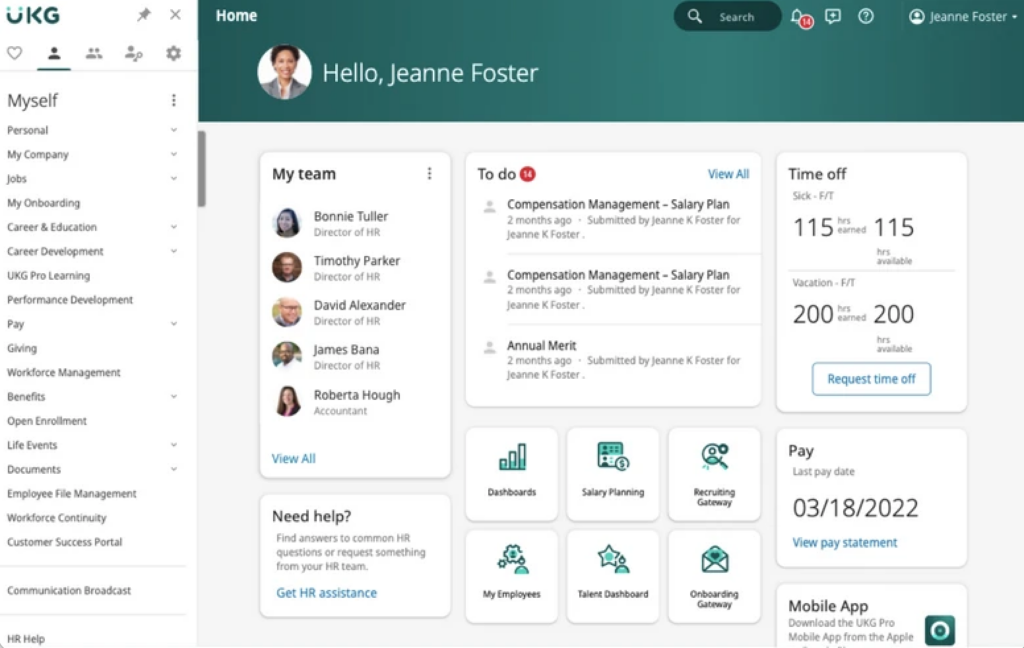
UKG (Ultimate Kronos Group) is a leading HR and workforce management system that combines powerful HR, payroll, talent management, and time tracking capabilities into one unified platform. Designed for businesses of all sizes, UKG offers flexible and scalable solutions to streamline HR processes, enhance employee engagement, and ensure compliance with labor regulations. Known for its user-friendly interface and robust automation features, UKG helps organizations manage their entire employee lifecycle, from hiring to retirement, while providing real-time analytics for better decision-making. UKG’s integrated system empowers HR teams to focus on strategic initiatives by simplifying day-to-day tasks.
Starting price: contact sales to get pricing
Pros
Strong automation tools to streamline HR processes.
Advanced analytics and reporting capabilities for data-driven decisions.
Excellent compliance management tools.
Scalable solution for growing businesses.
Employee self-service portal for streamlined HR management.
Cons
Pricing can be higher compared to other HR solutions.
Limited customization options for some features.
Some users report slower response times from customer support during peak periods.
TriNet
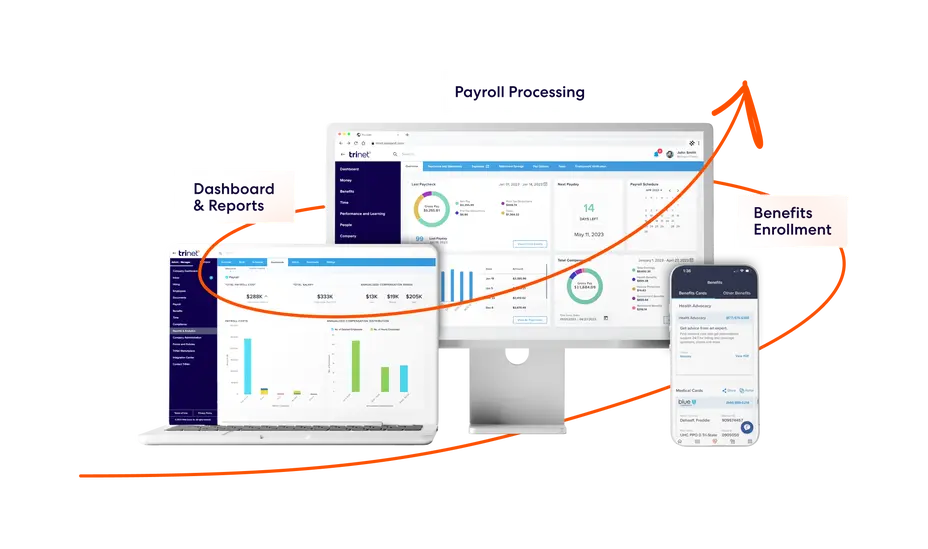
TriNet is a cloud-based HR solution designed to provide comprehensive human resources services for small and medium-sized businesses. Offering a wide range of features, including payroll, benefits administration, compliance management, and employee onboarding, TriNet allows companies to manage all aspects of their HR processes in one integrated platform. Known for its tailored industry-specific solutions, TriNet simplifies complex HR tasks while ensuring compliance with regulations. With its intuitive interface and robust support, TriNet helps businesses streamline operations, reduce administrative burdens, and enhance employee engagement.
Starting price: contact sales to get pricing
Pros
Comprehensive HR services, including payroll, benefits, and compliance.
Simplifies complex HR tasks through outsourcing.
Ensures compliance with local and federal regulations.
Scalable solution for growing businesses.
Employee self-service portal for streamlined HR management.
Cons
Pricing can be higher for small businesses.
Limited customization options for some features.
Advanced reporting and analytics may be less robust compared to larger HR systems.
In conclusion, selecting the right HR system for your organization is crucial to streamlining operations, improving employee engagement, and ensuring compliance with ever-changing regulations. Whether you need a comprehensive solution like Workday or ADP for large-scale management, or a more focused system like TriNet or BambooHR tailored to small and medium-sized businesses, the best HR platform depends on your specific needs and business size. By evaluating the features, pros, and cons of each system, you can choose a solution that enhances productivity, automates tedious tasks, and empowers your HR team to focus on strategic growth.